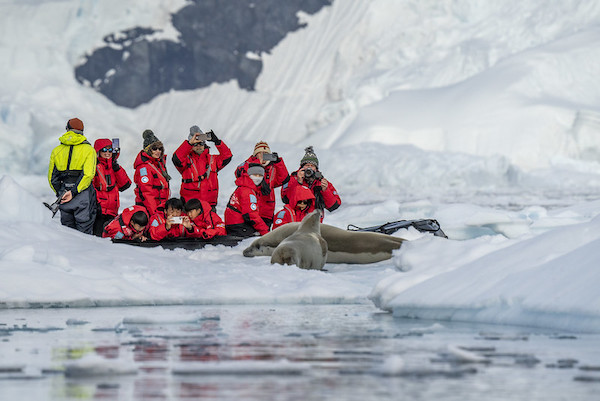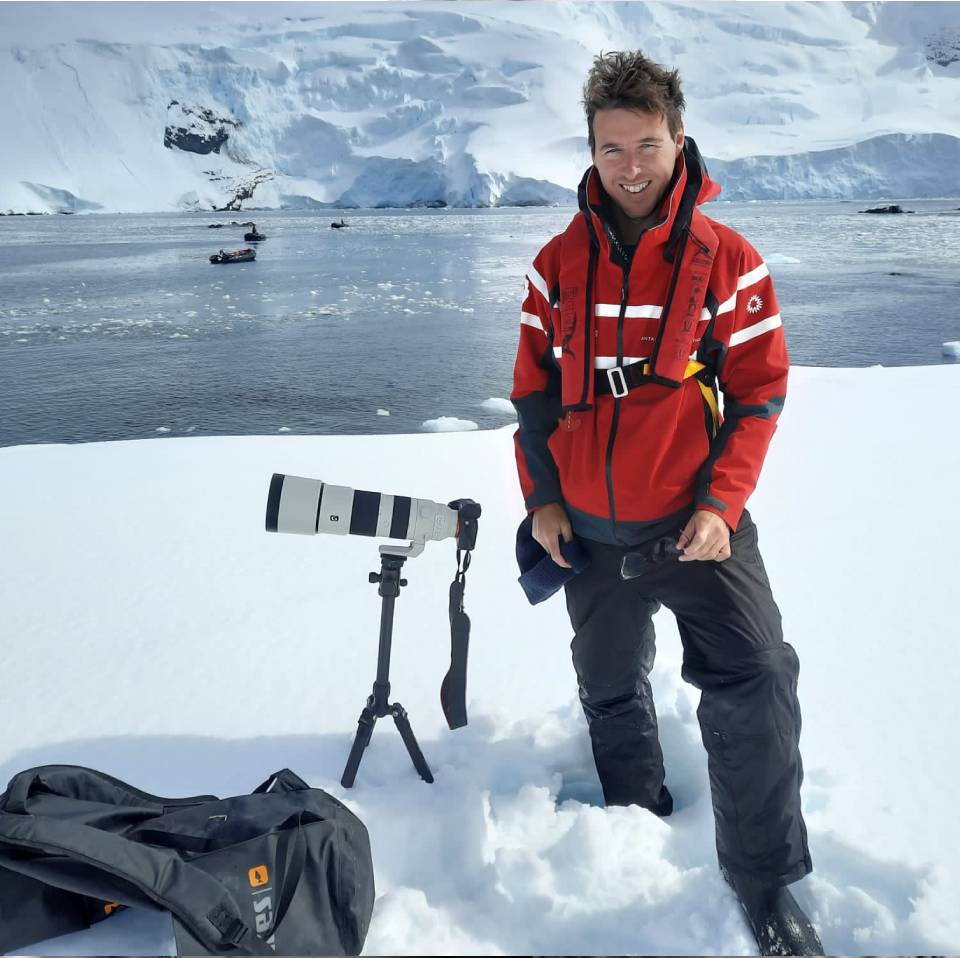Antarctica is a fragile ecosystem and is, therefore, highly susceptible to human impact.
As visitors to this amazing region, it's our responsibility to minimize our footprint and ensure that this extraordinary environment remains unspoiled for future generations.
Every year I travel to Antarctica I am blown away by just how much the ship’s staff and expedition teams care about protecting the environment. Whilst it is sometimes concerning how much tourism has grown in Antarctica, it is also heartening to see how much work is being done to protect it.
For those people wanting to visit this incredible land, here's a guide on how to travel responsibly in Antarctica.
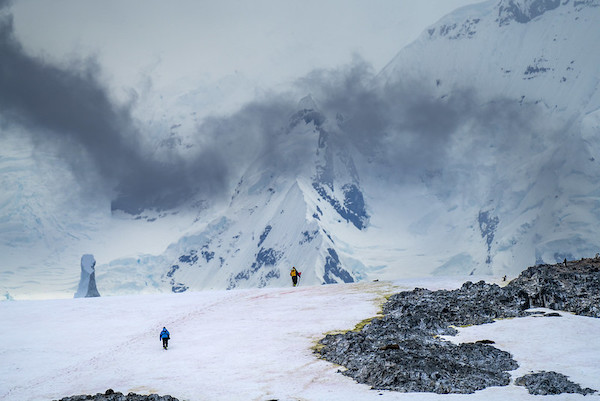
Leave No Trace
The principle of "Leave No Trace" is crucial in Antarctica, where even a small disturbance can have long-lasting effects.
As you will be informed by your expedition team, no food is to be bought ashore during landings. You are also not allowed to pee!
During your landings, make sure to stick to the designated pathways to avoid trampling on delicate mosses, lichens, and other flora that take decades to grow in this harsh environment.
Avoid collecting any souvenirs, such as rocks, bones, or feathers, as removing even natural items can disrupt the local balance. I know it can be tempting to take a ‘souvenir’ home, but please resist temptation.
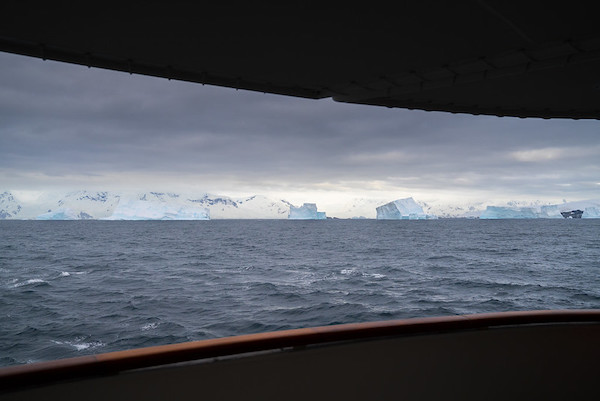
Respect the Environment
Antarctica's environment is incredibly delicate and harsh. The continent experiences extreme weather conditions and has ecosystems that have adapted to these specific environments over millennia.
Any introduction of foreign elements can be detrimental. This is why good operators will insist that you clean your bags and clothing thoroughly before any shore landings. I know it can be a little bit tedious, but it is worth it!
Avoid using products that contain harmful chemicals and ensure that all clothing and equipment are thoroughly cleaned before arrival to prevent introducing non-native species.
Be mindful of your activities and surroundings, making sure not to damage ice formations, disrupt bird nesting areas, or contaminate water sources.
Respect the Flora and Fauna
The wildlife of Antarctica is one of its biggest draws, but also one of its most vulnerable assets.
Penguins, seals, and birds are not accustomed to human presence, and any disturbance can cause stress, abandonment of nests, or even starvation for young animals.
Please make sure to follow the International Association of Antarctica Tour Operators (IAATO) advice which recommends that visitors stay at least 5 meters (16 feet) from penguins. The distance for seals and whales is even more.
Never feed or touch the wildlife, and use binoculars or zoom lenses for close-up views rather than approaching animals directly. The amount of times I’ve seen travelers try to touch or feed penguins is too many. I know they are cute, but please show restraint!
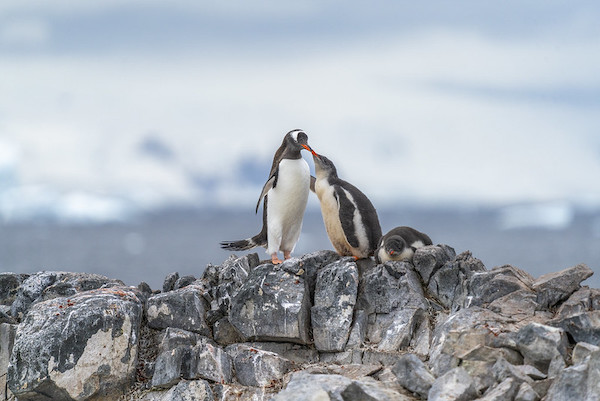
Offset Your Carbon Emissions
Traveling to Antarctica often involves long-haul flights and a voyage on an ice-strengthened vessel, both of which have significant carbon footprints.
To mitigate your impact, consider offsetting your carbon emissions by investing in renewable energy projects, reforestation, or carbon capture initiatives.
Some cruise operators even offer carbon offset programs as part of their packages. It's a small step and one that many people believe is just greenwashing, but it’s certainly better to do it than not!
Follow IAATO’s Rules
The International Association of Antarctica Tour Operators (IAATO) sets strict guidelines for visitors to protect the environment and ensure safe and responsible tourism.
These rules include limiting the number of visitors at any landing site, maintaining a minimum distance from wildlife, and ensuring that no biological or non-biodegradable waste is left behind.
I always advise that people familiarize themselves with these guidelines and follow their tour operator’s instructions closely to avoid accidental harm to the ecosystem.
Become an Ambassador for Antarctica After Visiting
The first time I saw Antarctica I knew I wanted to protect it. This is a feeling that is often shared among travelers and is a crucial point in how Antarctic tourism can be a force for good.
After experiencing the majesty of Antarctica, you can play a crucial role in its preservation by becoming an ambassador. Share your experiences and educate others about the importance of protecting this unique environment.
Support and promote conservation efforts, participate in clean-up campaigns, and encourage responsible tourism practices among fellow travelers.
Your voice can help raise awareness and contribute to the global effort to keep Antarctica pristine.
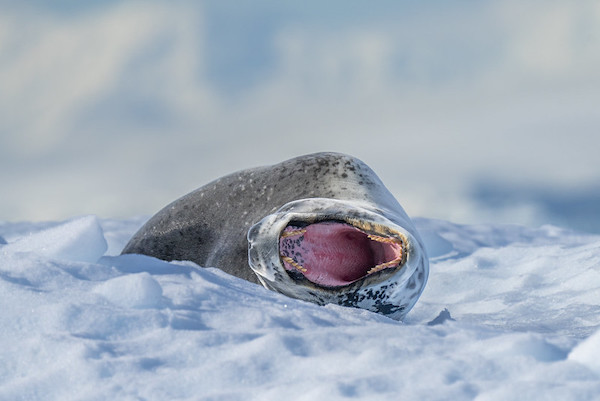
Know Your Own Limitations and Stay Safe
Antarctica is one of the most remote and challenging environments on Earth. Knowing your physical limitations is essential for your safety and the safety of others.
Don’t attempt activities beyond your fitness level or experience, such as challenging hikes or ice-climbing, without proper preparation and guidance.
Always follow your guide's instructions, stay with your group, and be prepared for sudden weather changes. Safety is paramount, and responsible travel means not putting yourself or others at risk.
Respect Scientific Research
Antarctica is a hub for scientific research, with numerous stations conducting vital studies on climate change, wildlife, and glaciology.
Respect these efforts by avoiding research sites unless invited and following all instructions when near research facilities. Visitors should be aware that their presence can disrupt experiments and data collection.
If your itinerary includes a visit to a research station, listen to the scientists, and ask questions to gain a deeper understanding of their work and the importance of preserving this continent.
Conclusion
By adhering to principles of responsible travel, respecting the environment, and following established guidelines, you can ensure that your visit leaves no trace and supports the ongoing conservation of this pristine wilderness.
I always tell fellow travelers that the goal is not only to experience the beauty of Antarctica but to help preserve it for generations to come.

